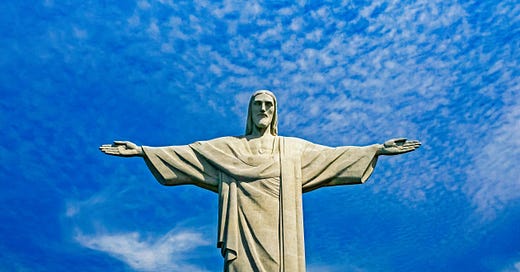I’m drawn these days to people who have lived through times of authoritarianism and injustice and deepened their spirituality and witness for good. When social catastrophe occurred, people such as Brazilian Archbishop Dom Helder Camara and so many others did not become bitter, avoid politics in favor of private spirituality, or yield to the pressure to conform. They deepened in faith, courage, and action despite repressive, often dangerous, consequences. Helder Camara embodies the “nonviolent resistance of the saints.”
Interestingly, before Helder Camara became a global Catholic leader of justice and spiritual renewal, he supported the Brazilian fascist party. A movement known as Brazilian Integralism sought to mirror European fascist parties in their concentration of power, suppression of dissent, and focused slogans of “God, Country, and Family.” (In this way, United States religious authoritarianism or Christian nationalism is not new). In his early years, Helder Camara worked as a young priest in the northeast province of Brazil, supporting the Integralist’s education efforts for a brief time and representing the Catholic Church. He eventually left and opted for a less politicized role that created space for him to grow, read, and awaken to the plight of the masses of people in poverty in Brazil.
In those days in Brazil, segments of church and government, aligned with the United States, opposed Communism as the great evil of the age. (Authoritarians use catch-all categories to scapegoat and punish dissenters). But Helder Camara began to realize that it was the larger economic inequalities that created the most suffering for the most people: “The greatest enemy of the church was not communism but the factors that led the masses to embrace communism … economic deprivation, and political powerlessness.” (Mary Hall, “The Impossible Dream”) After the military takeover of the government, Helder Camara served as an archbishop in northeast Brazil. He dedicated himself to advocating for causes to support people in poverty, especially the millions of people living in subhuman conditions in Brazil’s urban favelas.
Photo: Christ the Redeemer statue, Rio de Janeiro, Brazil
Helder Camara’s transformation reminds me of an incredible podcast series I’m listening to. It’s called “When the Wolves Came,” and it features Caleb Campbell, a former neo-Nazi skinhead who left behind his extremist ideology and became an evangelical pastor. But when Trump came to power and white evangelicals acquiesced to the MAGA movement, Campbell did not. Often under fire for dissenting from his fellow white evangelical Christians, he has helped nurture a community inspired by Jesus that calls into question the authority and values of Trump and the MAGA movement. Campbell opposes Christian nationalism because “I have seen the effects on people firsthand of divisiveness, dehumanization, fracturing in communities, and a blatant misrepresentation of what the gospel is and who it’s for.”
Helder Camara became a voice for justice and a beloved religious leader in Brazil and beyond. He organized a Brazilian bishops network and then a Latin American bishops council. These clergy gatherings in Catholic circles became renowned, or notorious, for their systemic analysis of poverty and the affirmation that God’s love is especially dedicated to those who are poor. He spoke aloud about the torture and disappearances that the military government had proliferated (such as Rubens Paiva, highlighted in the film “I’m Still Here.”) Helder Camara’s voice of conscience became so renowned internationally that eventually, the Brazilian regime banned the media from speaking about him. A vocal participant in the Second Vatican Council—a multi-year gathering of global Catholic leaders from 1962-1965 that sought to renew and modernize parts of the Catholic church and faith, he represented the Latin American priorities of justice for the poor rather than authoritarian domination.
I’m inspired by the fact that Helder Camara, throughout his advocacy for the church to respond to the violent crises in his country with justice, prayed tirelessly. In the book “The Impossible Dream,” he describes his prayer life, sharing his practice of rising at 2 am every morning to pray and write brief meditative and poetic reflections. His middle-of-the-night prayers became an examen of the people and suffering his heart carried that day. He says, “I open the window, look at the sky, read the psalms, and review the day that has passed. I recall all those that I met, the people I have seen; the news of the city, the nation, the world, interests me enormously”—and then he prays.
Sisters, brothers,
All creation sounds a warning:
Hear its siren.
(From It’s Midnight, Lord).






We care, so we dare,
despite discouragement, doubt.
Determined. Here, there.
...
With fierce friendliness,
with tenacious tenderness,
with bold hope we pray.
...
We call out, faith-filled,
with insistent endurance.
We’ll not disappear.
When the brave hear echoes of authoritarianism, they answer with, if not me, who? If not now, when? I am grateful for every person who came out in the cold yesterday in cities across the county to protest this regime. From a Lenten Retreat House on the Potomac, I prayed for all of you.